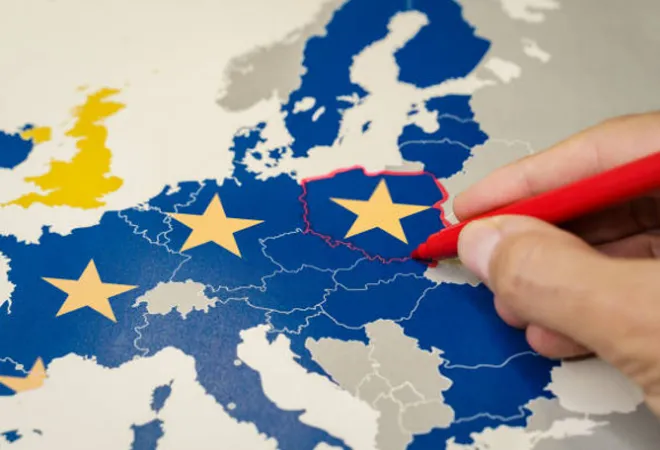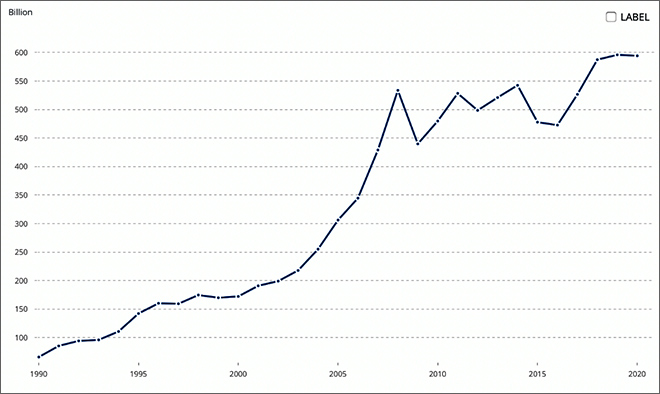-
CENTRES
Progammes & Centres
Location
The growing disjunction between Brussels and Warsaw sheds light on the overall questioning of Eurocentric values in the region.
 On October 8, after much deliberation, the Polish government published its Constitutional Tribunal finding which allows for the primacy of the Polish constitution over some of the EU laws. The tribunal highlights its incompatibility with four specific articles of the Treaty on the European Union (TEU) – Article 1, Article 2, Article 4(3), and Article 19. Article 1 establishes the foundation of the EU, while Article 2 emphasises normative values such as rule of law, freedom, democracy, equality, and respect for human rights. Similarly, Article 4(3) underlines mutual respect in assisting each other in carrying tasks from the treaties and Article 19 allows the European Court of Justice (CJEU) to ensure in interpretation and application of treaties the law is observed. By declaring incompatibility, the Polish government has effectively rejected the enforceability of the EU laws in Poland. Ursula von der Leyen, European Commission President, has expressed deep concerns with regards to the ruling as such ruling jeopardises the legal framework on which the EU exists, and the ruling also threatens the rule of law and respect to human rights especially for LGBTQ residents in Poland. She also added the Commission would commit “all the powers” to protect the binding legality of the CJEU. The Polish Prime Minister Mateusz Morawiecki brought the precedent forward in March by demarcating Brussels’ role in the Polish judicial system. The tribunal has further widened the distance between Warsaw and Brussels as the announcement of the primacy of the national constitution over the EU laws has brought forth discussions of “legal Polexit”, a term now used for Poland’s departure from the 27-member state bloc. Clement Beaune, France’s Europe Minister, fears the de-facto exit of Poland from the EU as do many across the continent, thereby, increasing the fear of regional and political instability.
On October 8, after much deliberation, the Polish government published its Constitutional Tribunal finding which allows for the primacy of the Polish constitution over some of the EU laws. The tribunal highlights its incompatibility with four specific articles of the Treaty on the European Union (TEU) – Article 1, Article 2, Article 4(3), and Article 19. Article 1 establishes the foundation of the EU, while Article 2 emphasises normative values such as rule of law, freedom, democracy, equality, and respect for human rights. Similarly, Article 4(3) underlines mutual respect in assisting each other in carrying tasks from the treaties and Article 19 allows the European Court of Justice (CJEU) to ensure in interpretation and application of treaties the law is observed. By declaring incompatibility, the Polish government has effectively rejected the enforceability of the EU laws in Poland. Ursula von der Leyen, European Commission President, has expressed deep concerns with regards to the ruling as such ruling jeopardises the legal framework on which the EU exists, and the ruling also threatens the rule of law and respect to human rights especially for LGBTQ residents in Poland. She also added the Commission would commit “all the powers” to protect the binding legality of the CJEU. The Polish Prime Minister Mateusz Morawiecki brought the precedent forward in March by demarcating Brussels’ role in the Polish judicial system. The tribunal has further widened the distance between Warsaw and Brussels as the announcement of the primacy of the national constitution over the EU laws has brought forth discussions of “legal Polexit”, a term now used for Poland’s departure from the 27-member state bloc. Clement Beaune, France’s Europe Minister, fears the de-facto exit of Poland from the EU as do many across the continent, thereby, increasing the fear of regional and political instability.
The Polish Prime Minister Mateusz Morawiecki brought the precedent forward in March by demarcating Brussels’ role in the Polish judicial system.The European Commission (EC) has halted funds allocated for Poland’s (and Hungary’s) pandemic recovery spending worth €23 billion in grants and €34 billion in loans primarily due to the Constitutional Tribunal case and Poland’s breach of the rule of law. The Polish government is in dire need of the EU’s money as parliamentary elections are due in 2023 and the ruling government could use the funds to bolster their popularity and improve their coordination with the EU in energy and security affairs. The decision has now alarmed the EU as fears of democratic backsliding would be exacerbated around the region with Hungary and Poland already breaching the rule of law and passing controversial bills to prevent the entry of migrants and curtailing media freedom. The rejection of the primacy of EU laws can now set forth a precedent for other member states calling for the primacy of national laws over supranational laws. In the past, the Supreme Court of Ireland signalled clashes between national and EU laws, but the Irish government reverted to EU laws over the national constitution. Poland’s decision has sent shockwaves across Europe as many fear the worst for the bloc whereas others on the far-right have lauded and embraced Poland’s decision. Arnaud Montebourg, former French Socialist government minister and a presidential candidate, has welcomed Poland’s decision and has demanded France to initiate affirmation of the superiority of French national laws over EU laws. Similarly, Xavier Bertrand, a presidential candidate from Les Républicains, has proposed amendments in the French constitutions to safeguard French interests over European. President Macron, a firm believer in the Eurocentric values and beliefs, faces a major challenge in the upcoming 2022 French Presidential elections as the trust in the EU institutions in France is at an all-time low with only an approval rate of 36 percent.
Poland’s decision has sent shockwaves across Europe as many fear the worst for the bloc whereas others on the far-right have lauded and embraced Poland’s decision.Figure 1: GDP US$ Poland; Witnessing growth since joining the EU in 2004
 Source: World Bank Database 2021
Source: World Bank Database 2021The delays in the Next Generation Funds by the EC to Poland would weaken Poland’s FDI inflows in its key sector such as energy and infrastructure as thousands of Poles are employed in the mining industry.Since 2015, PiS party has locked horns with the EU on multiple issues as the government has eroded the democracy and judicial framework of Poland. PiS has attempted to replace judges with its nominees to befit their amendments as it aims to bring about sweeping changes in Polish governance. PiS, since then, has weakened and curtailed media rights, banned abortion in accordance with the Polish Catholic Church. In Poland, over 200,000 women have carried abortions legally or travelled abroad for the procedure. PiS aims to counteract any legal adoption enforced by the EU, thus, manufacturing ideas of Polish departure from the EU. Poland witnesses a judicial whirlwind as the Polish government approaches the CJEU seeking its intervention to strike down the EU’s new measure to cut off funds from the bloc’s allocated budget. The new measure allows the EU to act over rule-of-law shortcomings in member states. Warsaw and Budapest fear the loss of EU cohesion funds as the respective lawyers argue in the court over the “rule of law conditionality mechanism” which the two feel is an improper measure to administer the EU budget. Additionally, The CJEU has fined Poland €500,000 per day for carrying lignite mining activities at the Turów mine near the Czech–Poland border. Poland has added to the growing list of worries for the EU as Brussels attempts to juggle multiple issues at once as concerns over natural gas storage capacity and growing electricity rates across Europe worries the bloc. With growing populism, the resurgence of far-right across Europe and the departure of Angela Merkel from European politics puts France in a point of no return as President Macron now assumes the throne as the protector and guardian of the European values. However, the 2022 French presidential elections could be a monumental moment for the EU's governance and its rhetoric as the emergence of far-right and Eurosceptic parties will enable greater divergences between the member states as witnessed in the case between Warsaw and Brussels. Poland is not leaving the European Union but surely has set a precedent for others to follow which could witness a probable exit elsewhere.
The views expressed above belong to the author(s). ORF research and analyses now available on Telegram! Click here to access our curated content — blogs, longforms and interviews.

Rahul Kamath was a Research Assistant with ORFs Strategic Studies Programme.
Read More +